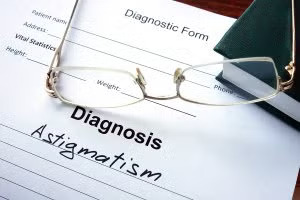If you think you may have astigmatism and live in Derry, Londonderry, or near Windham, visit your eye specialist for an eye exam. There are several types of astigmatism which all have similar symptoms.
Symptoms of Astigmatism
People who have astigmatism in one or both of their eyes will typically experience vision that is blurred or distorted at any distance instead of only objects that are near or far. It’s common for astigmatism sufferers to find themselves squinting frequently. The eye strain caused by uncorrected astigmatism can lead to headaches after activities such as reading.

Causes of Astigmatism
Most cases of astigmatism are caused by an irregularly shaped cornea, which is the transparent part of the eye that covers the pupil and iris. A healthy cornea is round and symmetrical in shape while one with corneal astigmatism is oblong. In some cases, astigmatism is caused by an irregularly shaped lens inside of the eye, referred to as lenticular astigmatism.
Types of Astigmatism
Ophthalmologists describe astigmatism in terms of meridians, which can be thought of as two perpendicular lines, with one wrapping vertically around the eye and the other crossing it horizontally. Myopic astigmatism occurs when one or both meridians of the eye are affected by nearsightedness, and hyperopic astigmatism describes the condition where one or both meridians of the eye are farsighted. When both meridians are either farsighted or nearsighted, they will always be of differing degrees in the case of astigmatism. When a patient’s eye has one nearsighted and one farsighted meridian, it’s described as mixed astigmatism.
Regular and Irregular
When looking at an eye afflicted with astigmatism, the meridians that are the flattest and the steepest are referred to as the principal meridians. When the principal meridians are perpendicular to each other, it’s called regular astigmatism and gives the front surface of the eye a pointed shape. Irregular astigmatism describes an eye where the principal meridians aren’t perpendicular and can result from injury or keratoconus, a condition that causes a thinning of the cornea.
- Allergies and Dry Eyes2
- Astigmatism5
- Bifocal Contact Lenses1
- Cataracts15
- Children6
- Contact Lenses17
- Contacts6
- Cosmetic Eye Procedure1
- Cosmetic Surgery1
- Crizal Prevencia1
- Diabetes3
- Dry Eye Syndrome Manchester4
- Dry Eyes24
- Effects of Exercise1
- Eye Care45
- Eye Disease3
- Eye Doctors17
- Eye Exams31
- Eye health44
- Eye irritation7
- Eye Strain3
- Eye Syndrome1
- Featured Post8
- Financing Options1
- Glasses20
- Glasses or Contacts1
- Glaucoma12
- Infographic3
- IPL3
- Lasik28
- LASIK Surgery23
- Lip Care1
- Macular Degeneration4
- Ocular Diseases2
- Pulsed Light Therapy1
- Refractive Errors1
- Spindel Eye2
- Spindel Eye Reviews16
- Sunglasses2
- Top-Tier Awards1
- Trifocal1
- Vision Care13
- Winter eyecare1
- Winter glare1
